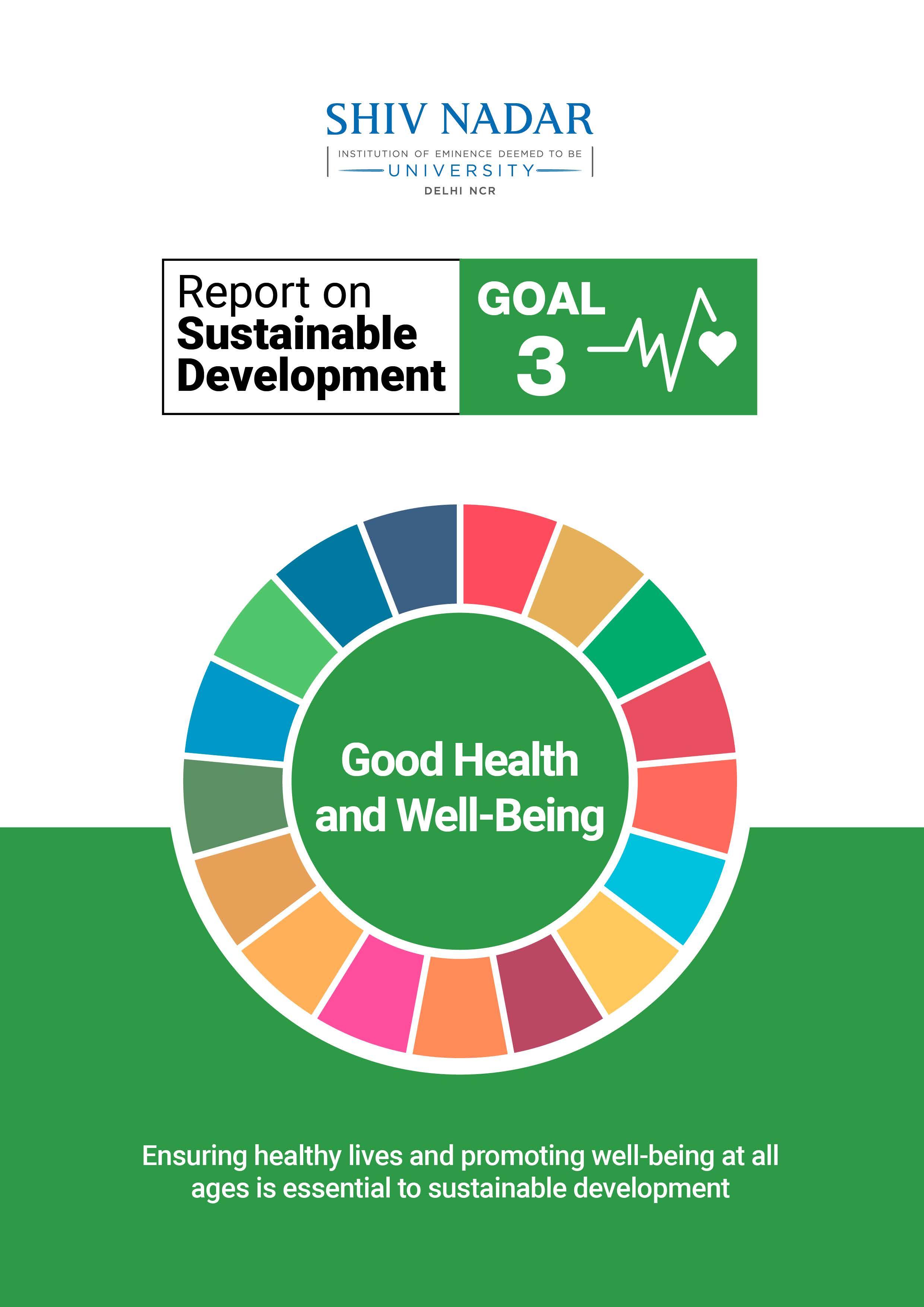

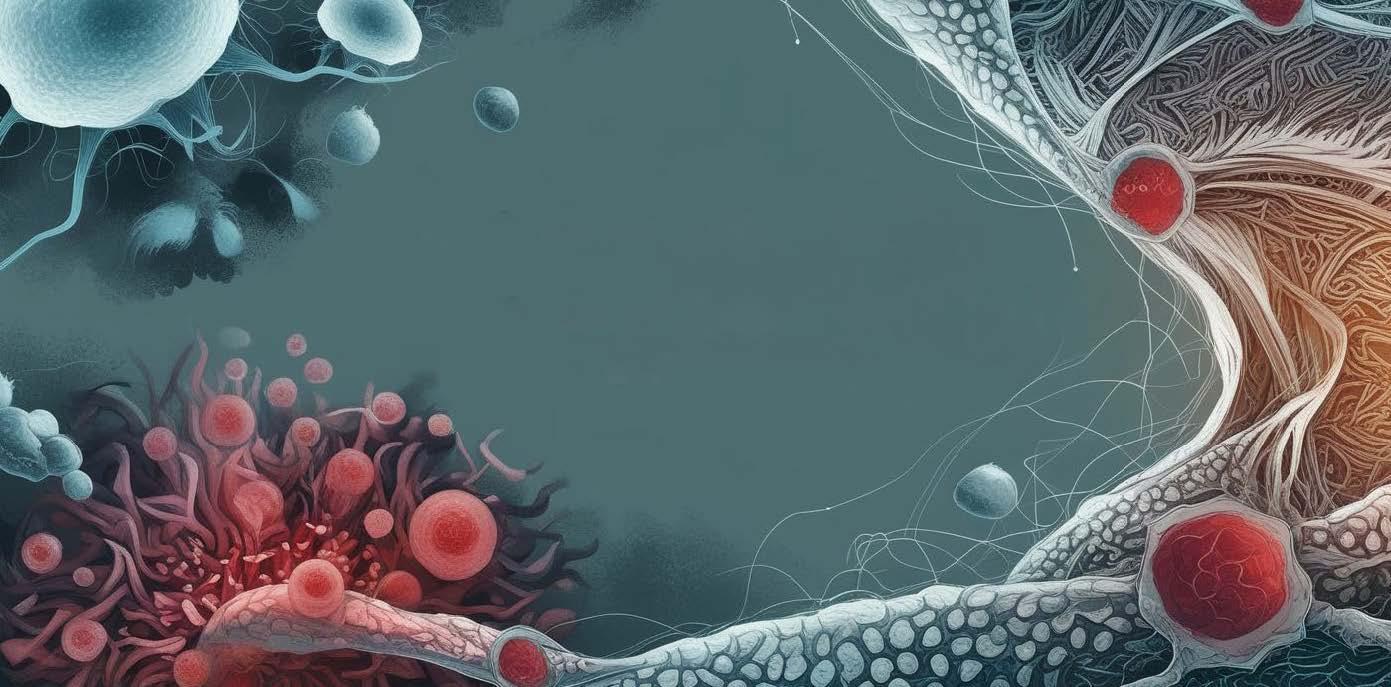
Sustainable Development Goal 3 aims to achieve universal health coverage while ensuring healthy lives and promoting well-being at all ages. It supports the foundation for individuals to thrive and societies to develop sustainably. Universities have a significant role in addressing specific health conditions and promoting societal well-being through research, strong partnerships, and training staff in essential health information and habits.
At Shiv Nadar University, the School of Natural Sciences excels in cutting-edge research and partnerships, pushing frontiers of knowledge to achieve research excellence across diverse disciplines, such as virology, neurobiology, protein structural biology, medicinal chemistry, and biotechnology, to name a few. The research is enabled by state-of-the-art laboratories and computational facilities established in the school.
The report is a glimpse of our work advancing SDG 3 through our teaching, research, institutional practices, and partnerships.
TEACHING AND LEARNING
Many departments in the School of Natural Sciences offer undergraduate courses, such as Immunology
(BIO 207) and Biology of Infectious Diseases (BIO 306), which deliver on the history of infectious diseases, concepts of disease dynamics, parasite diversity, evolution & ecology of infectious diseases, as well as the emergence of diseases. Recombinant DNA Technology (BIO 307), Drug Design & Drug Development (BIO 308), Cancer Biology (BIO 309), Biology of Infectious Diseases (BIO 310), HostPathogen Interaction (BIO 314), Epigenetics (BIO 323), Neuroscience and Cognition (BIO 332), to name a few.

The Department of Chemistry offers a course in Informatics and Drug Discovery (CHY 522), which explores the field of Bioinformatics and Cheminformatics to find new drugs with specific physiological effects.
Students Stories
Exploring the role of noncoding RNAs in depression-like behavior
Shreyasi Mitra is, Ph.D. scholar under the guidance of Dr. Geetanjali Chawla, Assistant Professor, Department of Life Science. Shreyasi works in Dr. Chawla’s spearheads a project focused on the characterization of molecular players involved in depression. With the rise in the prevalence of mental illness among all ages, the identification of novel molecules and pathways remains crucial in understanding the etiopathology of the disease. Shreyasi is actively elucidating the pathway through which stress response is regulated at the organismal level. In the future, this study will pave the way for developing new diagnostic biomarkers for depression.
She was awarded the best poster award at the “Vistas in Life Sciences 2024”, an International Conference on Frontiers of life Sciences: From molecules, organisms and diseases, held at the Jawaharlal Nehru University in January 2024 and another award for the best poster in June 2024 at the India-EMBO lecture course held at Indian Institute of Technology, Delhi and Shiv Nadar University.

Student Projects – Social Sector Internship
All undergraduate students in the School of Management and Entrepreneurship undertake a Social Sector Internship (SSI), a mandatory 6-credit Bachelor of Management Studies (BMS) curriculum component. The 8-week-long internship allows students to work on real-life projects with nonprofit organizations (NGOs, government agencies, cooperatives, CSRs, etc.) and an immersion in rural and non-urban ecosystems under the guidance of eminent development professionals. Our students work with local communities to ameliorate social enterprise challenges or create growth models for the social sector.
Some examples of these projects in SDG 3 are:
Aliya Khan worked at CareNidhi.
At the Centre for Applied Research and Education on Neurodevelopmental Research and Disability related Health Initiatives (CARENIDHI), Aliya worked on a project on Disability-related Health Initiatives (CARENIDHI). She closely worked with the center’s Student Network for Education & Health for All (SNEHA) and their Disability Inclusive Development Initiatives (DIDI).
Burzin Tantra worked with Jivika Family Vaccination Clinic’s – Cervical Cancer Mukt Bharat.
Jivika Healthcare is a social enterprise working to fill the gaps and solve unsolved healthcare problems. Jivika’s Cervical Cancer Mukt Bharat Abhiyaan is an extensive program focused on solving the 3 Major Problems – “3 A” –Affordability, Accessibility & Awareness.
Burzin worked with the training of the ‘Arogya Sevika’ project. From interviews, training on doorto-door to create awareness on the importance of Cervical Cancer Screening & Vaccination. And empower these sewikas with the knowledge to be financially independent. Jivika also partners with GPs/family physicians to provide vaccination, giving added footfall to the patients and ultimately leveraging the existing network to strengthen public health.

Vanisha Gupta worked with Tech Mahindra Foundation on their project Mind@Ease.
This mental health and well-being-based initiative conducts research and hygiene checks for the website partners and supports deboarding/ onboarding, along with building a resource repository. The project has champions of mental health, a peer support system aimed at building student leaders in SMART classrooms.
Go Green Club – Health and Sustainable Lifestyle
A sustainability event focused on personal care products was held, raising awareness about the industry’s environmental impact. The event highlighted alternatives like bamboo sanitary napkins and menstrual cups. Around 150 women on campus participated and learnt about the eco-friendly choices and the dangers of chemicals in traditional products. Fun quizzes encouraged a shift towards a more sustainable lifestyle.
Subhasri S worked with MS Chellamuthu Trust and Research Foundation.
The community mental health project is a comprehensive approach to address the mental health needs of the population within a community. Started in the year 2000 with the support of Andheri Hilf, Germany, the project has transformed the lives of 3757 persons with mental health problems and their families. The project is designed to provide accessible, culturally sensitive, and effective mental health services to individuals and families within a particular geographic area or demographic group.
Health and Menstrual Awareness Session for Housekeeping Staff
On November 12, 2024, the Active Dreams and Gender Champions of Shiv Nadar University Chapters organized a Menstrual Health Session for the housekeeping staff. A gynecologist led the session to raise awareness, dispel myths, and provide vital information on menstrual health, such as understanding the menstrual cycle, debunking taboos, hygiene practices, and addressing health concerns.
This was followed by a free health checkup. The attendees expressed gratitude and appreciation for the open and judgment-free space. Events like this impart inclusivity, empower participants with knowledge, foster a supportive workplace, break the stigma surrounding menstruation, and promote health education.
The event also partnered with Active Dreams, who provided menstrual health awareness and instructional sessions using menstrual cups, a new and sustainable alternative to sanitary napkins.
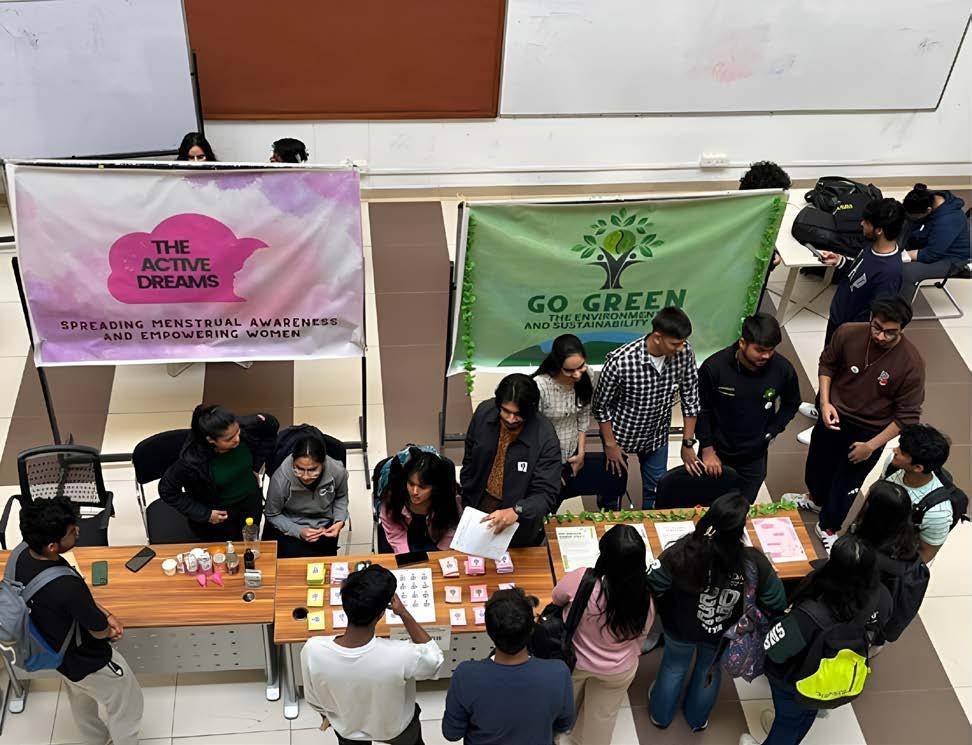
RESEARCH
Center for Integrative and Translational Research - CITRES
The School of Natural Sciences is also home to world-class genomics, proteomics, and advanced imaging infrastructure.
The Centre for Integrative and Translational Research (CITRES) is a cutting-edge, 30,000 sq. ft. national facility for pre-clinical models for human diseases. This state-of-the-art facility has been established to serve as a national facility and offer exceptional benefits to the scientific community in India and beyond. With a vision to lead translational research and technological innovation with realworld applications, the center is equipped to import, maintain, serve as a repository, and generate
in-house transgenic/knock-out mice, rats, and zebrafish. It accelerates the efficient transition of basic science discoveries into practice, especially those directly benefiting human health.
The CITRES has undertaken many significant projects, encouraging and promoting multidisciplinary collaboration among laboratory and clinical researchers, incorporating the needs of the public, with local communities being engaged to determine their needs for health innovation, and identifying and supporting the adoption of best medical and health practices.
To support this grand mission, Shiv Nadar University has also established the Centre of Excellence in Epigenetics and the Revvity and SNU Centre of Excellence in Drug Discovery.
Exploiting the fitness cost of transforming growth factor-b signaling pathway dependency of chemotherapy-resistant, senescent triple-negative breast cancer cells: An evolution-guided therapeutic approach.
Dr. Anindita Chakrabarty, Associate Professor, Department of Life Sciences, is working on a SERBCRG-funded project of INR 5,903,786.
The project explores the possibilities of targeting a specific cell-to-cell communication pathway, known as the transforming growth factor-b signaling, in a systematic manner to prevent the evolution of drugresistant tumors. If successful, such a strategy can have a significant impact on the overall quality of life and clinical outcomes of patients with triple-negative breast cancer.

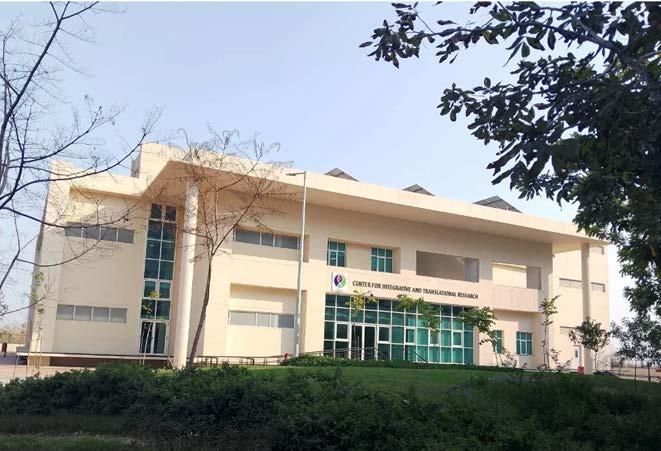
This project explains the phenomenon of adaptive resistance. It follows the core principles of Darwinian evolution, just as antibiotics and antivirals, and anticancer drugs also often lose their efficacy due to the gradual emergence of resistance. Breast cancer, being the most prevalent cancer in women worldwide, is responsible for a significant number of mortalities due to the development of drug resistance. Patients with triple-negative breast cancer are at the highest risk of death within five years of diagnosis due to treatment failure.

Inter-Departmental Partnership to Explore the Modulatory Role of Vms1 During Mitochondrial Proteotoxic Stress
Dr. Koyeli Mapa, Associate Professor, School of Natural Sciences, and Dr. Richa Priyadarshini, Associate Professor, School of Natural Sciences, have been awarded a grant from SERB-CRG, Government of India, for three years.
This project aims to understand the role of a protein named Vms1 during protein-misfolding-induced stress in mitochondria, the cellular powerhouse. The ongoing work supported by this grant suggests that Vms1 plays an essential role in protecting mitochondria from protein-misfolding-induced stresses and protects the function of this important

organelle. Knowledge generated from this project will set the stage for a new field of research in the area of mitochondrial stress response pathways. The role of Vms1 during mitochondrial proteotoxic stress is a nearly unexplored area of study, and this project may shed new light on the role of this protein in protecting mitochondria from stresses.
Dr Rajan Vyas from the Department of Life Sciences at the University has collaborated on this project to decipher the structure of the Vms1 protein.
Solutions of Tomorrow –Bio-degradable food wrapping
Dr. Yamini Sudha, Associate Professor, Department of Chemical Engineering, has used pectin biopolymer to develop composite thin films for bio-degradable vegetable and fruit wraps. Her research aims to significantly boost the shelf life of produce and reduce hazards to the human body and nature.
The biodegradable wraps are made by extracting pectin from bananas, oranges, and sweet lime. They are a natural, edible coating that can replace synthetic wax, which gives fruits gloss and longevity. She and her research group have successfully produced small films with improved properties compared to pure pectin films. “We are now working on process-related improvements to scale up the film production with the required physical, chemical, and mechanical properties,” she says.
Dr. Sudha’s research is linked to SDG 3 (good health and well-being), SDG 11 (sustainable cities and communities), SDG 12 (responsible consumption and production), and SDG 13, 14, and 15 (climate action, life below water, and life on land).
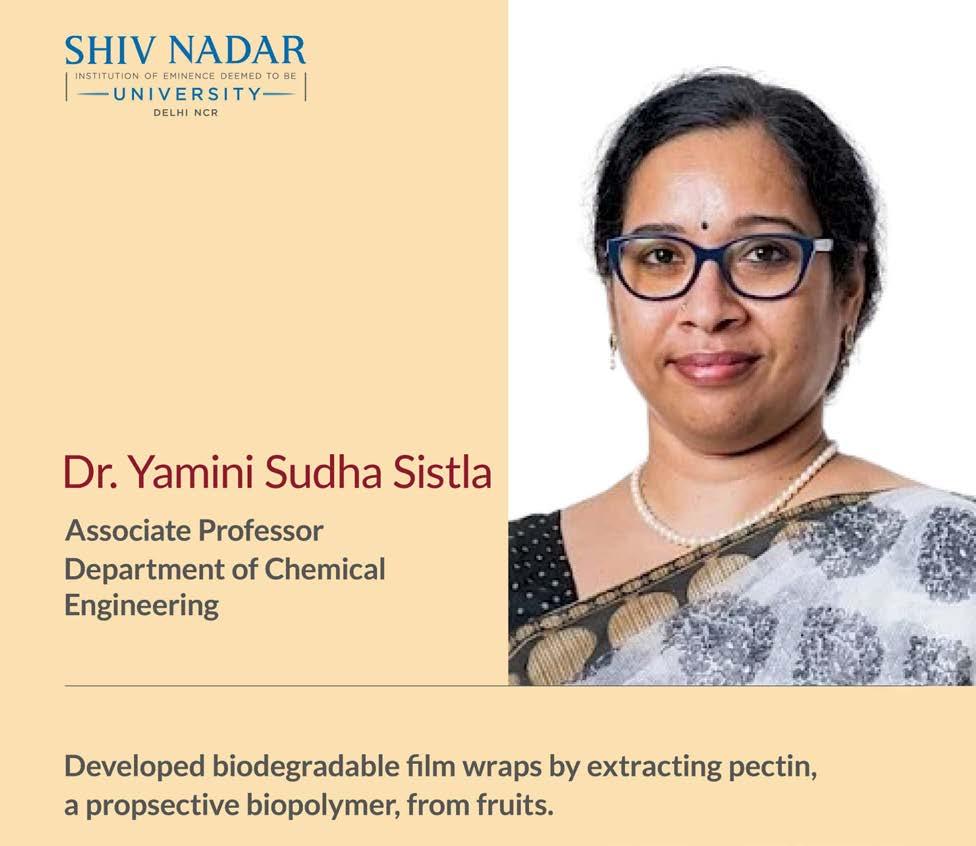
MicroRNA biogenesis factors in ageing and age-related diseases
Ageing is the largest known risk factor for numerous prevalent noncommunicable diseases, yet the molecular mechanisms underlying this process are largely unknown. To understand the relationship between age-related diseases and normal ageing, it is crucial to characterize the regulatory mechanisms that link different tissues’ functions with the whole organism’s biology.
Dr. Geetanjali Chawla’s laboratory and others have linked aberrant microRNA (miRNA) expression to ageing and age-related pathologies. These studies have emphasized the importance of miRNA biogenesis factors, which are RNA-binding proteins (RBPs), in ensuring tight control of miRNA biogenesis. Previous work from Dr. Chawla’s laboratory has also highlighted the importance of terminal loops and stem-base in the differential expression of clustered miRNAs. Her team uses genetic, biochemical, and molecular approaches to understand how these RBPs modulate lifespan and health span. This work is funded by the SERBCRG grant and SNIoE. Work is in progress to design strategies for modifying the function of RBPs to treat and prevent age-related diseases.
MRI tractographic validation of drug-enhanced hepatic clearance of amyloid-beta and the therapeutic potential for Alzheimer’s Disease: A pilot study
Alzheimer’s disease (AD) may require alternative therapeutic perspectives as current interventions may sometimes be sub-optimal. Amyloid-beta 42 (Aβ42) is mainly eliminated by hepatic clearance, which diminishes in AD. Hence, hepatomodulatory drugs enhancing this clearance may potentially have therapeutic implications. This project clinically substantiates systems-biology investigation on repurposed hepatomodulating drugs (metformin, cilostazol, and rifampicin), which enhance brain insoluble Aβ42 clearance through the liver-bile-feces route.
The MRI-tractographic analysis formulated a three-segmental basis of brain Aβ42 spread: fronto-thalamic region (segment-1), temporooccipital region (segment-2), and dorso-cingulate
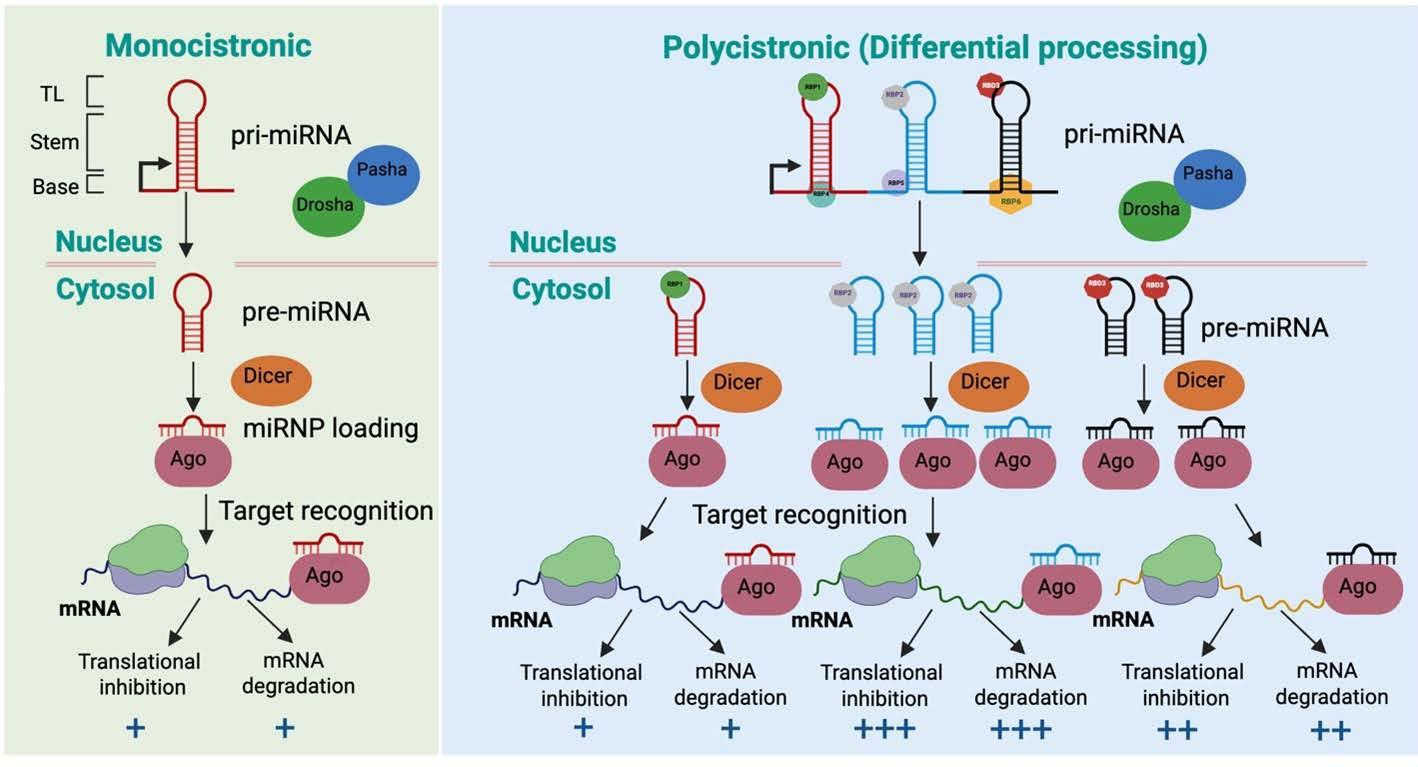
Figure 1. Auxiliary miRNA biogenesis factors in ageing and age-related diseases.
region (segment-3). This segmental pattern is histopathologically corroborated by Braak’s stages A, B, and C. Observations showed that three pharmaceuticals acted differently on those three segmental regions. Analyzing MRI and DTI images of 15 healthy controls (CDR: 0; MMSE: 24–20) and 15 AD patients (CDR: 0.5–1.0; MMSE: 20–26), it was found that, tractographically, there is a significant reduction in neuronal integrity in the three regions above in untreated AD compared to controls.
Bhattacharjee, Anindita, and Prasun K. Roy. “MRI tractographic validation of drug-enhanced hepatic clearance of amyloid-beta and the therapeutic potential for Alzheimer’s Disease: A pilot study.” Brain Disorders 13 (2024): 100112.
Alleviating Help-Seeking Stigma Among Depressed College Students Through Shadow Social Marketing: A
Meso-Level Intervention to a Wicked
Problem
This interesting study addresses the issue of societal stigma attached to mental health issues of college students, which strongly suppresses their attempts at help-seeking. The study designs a meso-level midstream intervention to effect a behavior change in mentally depressed students, who, due
to internalized societal stigma attached to mental health issues, strongly evade help-seeking. The study explores addressing a complex problem that does not have a direct, clear-cut solution at either the micro or the macro level. Hence, it investigates whether an SSM meso-intervention performs better than micro-interventions in alleviating the social stigma attached to mental health issues.
Goswami, Paromita, and Jaideep Ghosh. “Alleviating Help-Seeking Stigma Among Depressed College Students Through Shadow Social Marketing: A Meso-Level Intervention to a Wicked Problem.” Social Marketing Quarterly (2024): 15245004231225457.
Catalyst Free Synthesis of 4-Aryl/ Alkylamino-1, 2-Naphthoquinones: Applications in Fluorescence Microscopy
An efficient one-step reagent-free synthesis of 4-Aryl/alkylamino-1,2-naphthoquinones in water and iPrOH (1 : 1) mixture was carried out at room temperature (RT) using 4-amino-3hydroxynaphthalene-1-sulfonic acid and various primary and secondary aryl and alkyl amines. The reaction did not proceed in the absence of air or oxygen. In all cases, good yields (isolated yield:

≥65 %) were observed. The compounds exhibited fluorescence emission bands (400–470 nm) in the visible region upon excitation at their respective λmax values (330–350 nm). We evaluated in vitro cytotoxicity of some of the derivatives against two human breast cancer cell lines (MCF-7, and MDA-MB-231) using the WST-1 assay. The naphthoquinone derivatives did not show any cytotoxic effects at concentration levels relevant to cellular fluorescence imaging. The imaging experiments revealed that a few of the derivatives hold the potential to be used as cellular fluorescent imaging probes.
Nagar, Bhawana, Tanya Agrawal, Tatini Rakshit, and Basab Bijayi Dhar. “Catalyst Free Synthesis of 4-Aryl/Alkylamino-1, 2-Naphthoquinones: Applications in Fluorescence Microscopy.” ChemistrySelect 9, no. 36 (2024): e202402531.
CONVERSATIONS ON CAMPUS
3-day Genomics India Conference 2024 held at Shiv Nadar U[]niversity, Delhi NCR
The Genomics India Conference 2024 was held from February 1-3, 2024. Fourth, in the Genomics India series, the conference theme focused on ‘Harnessing Genomics for A Sustainable Future.’ It featured cutting-edge research into the latest advances in genetic technologies, focusing on sharing pathbreaking findings. Dedicated to showcasing the latest research, technologies, breakthroughs, challenges, and strategies in genomics, the conference was attended by Dr. Rajesh Gokhale, Secretary of the Department of Biotechnology, Government of India, and over 500 leaders in genomics from the USA, UK, Europe, and the Asia Pacific region.

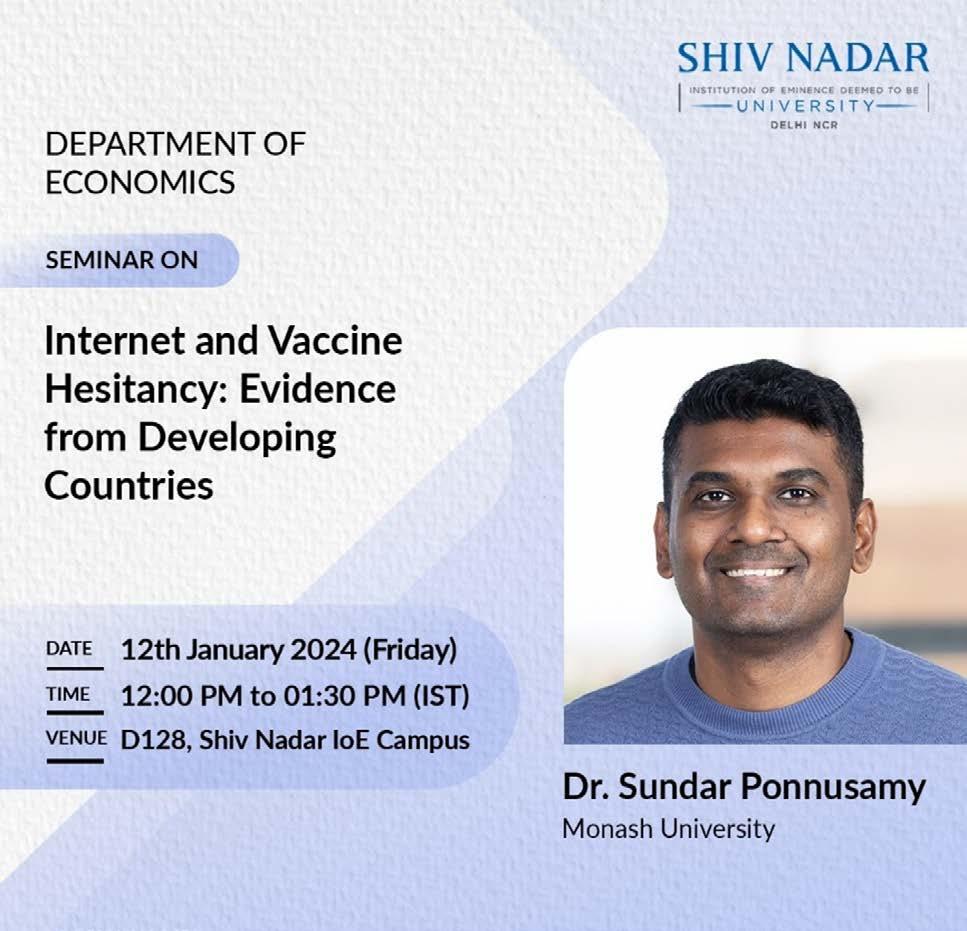
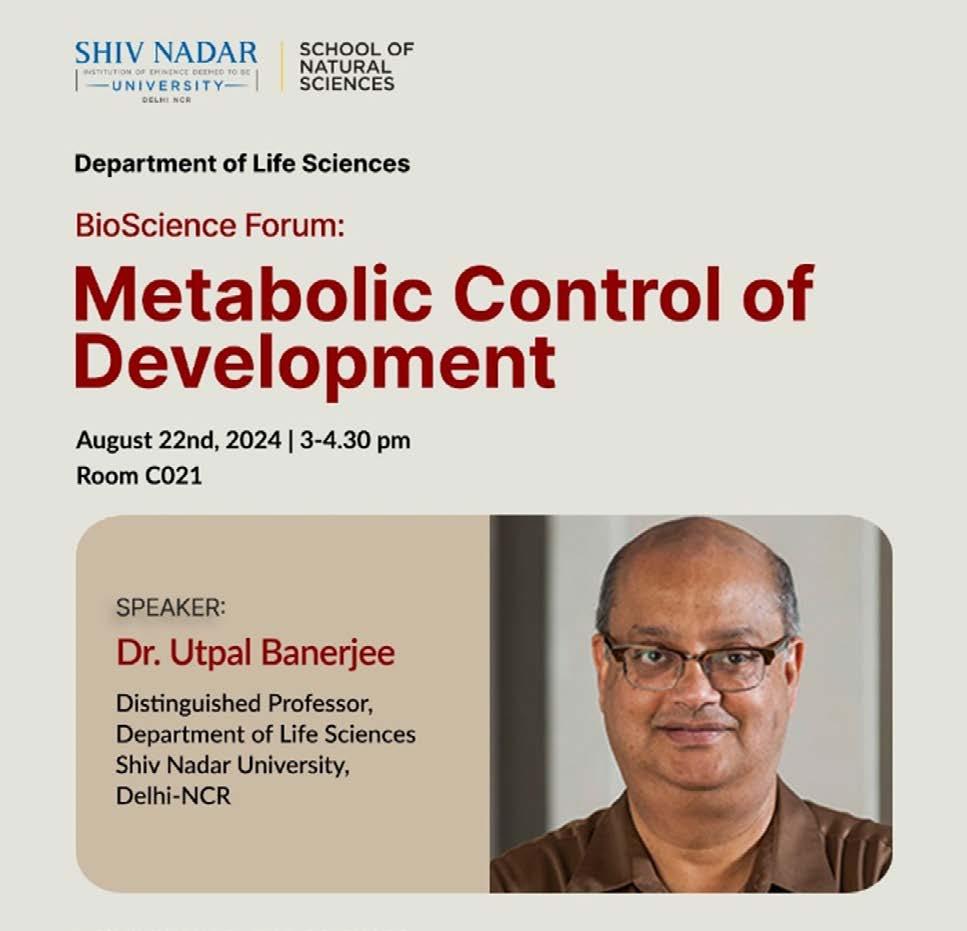
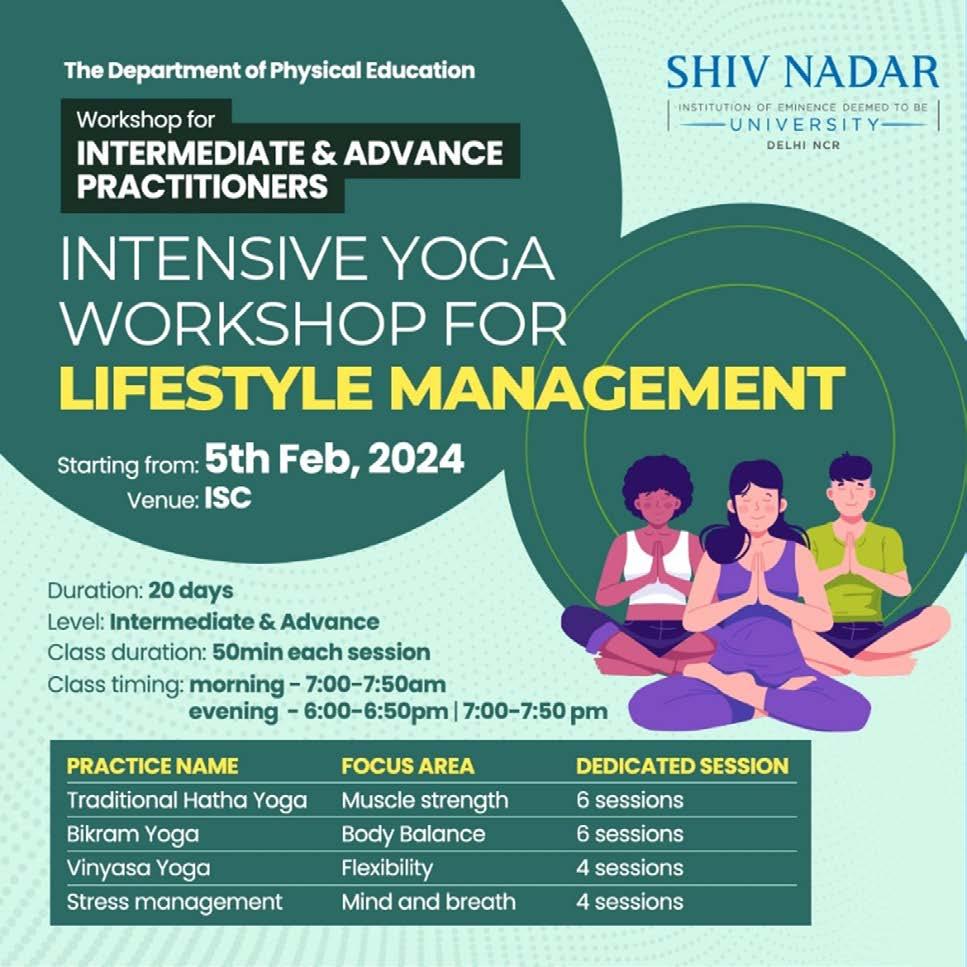
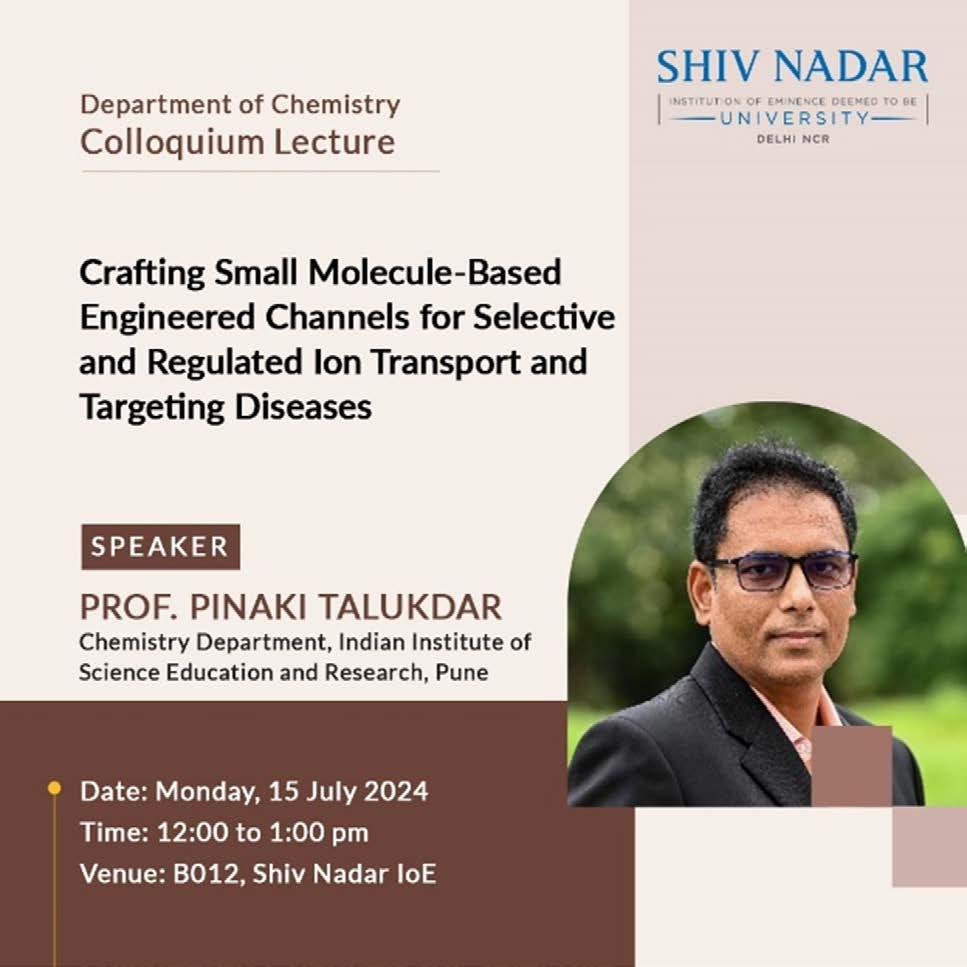


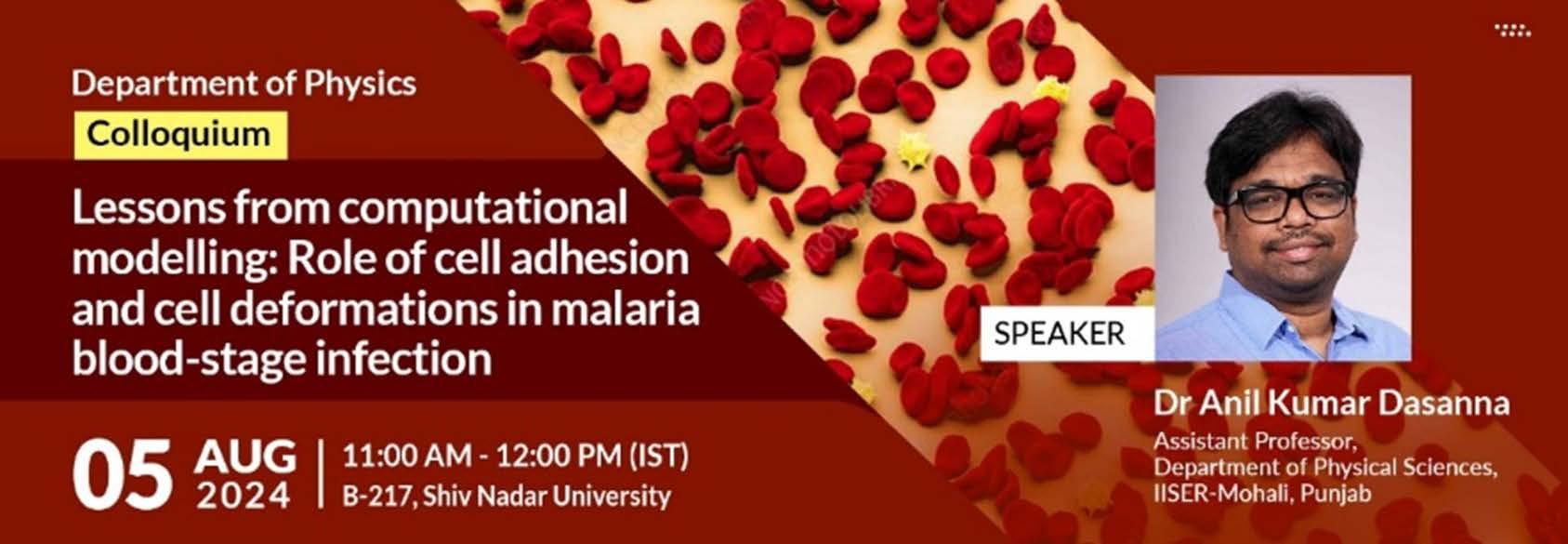

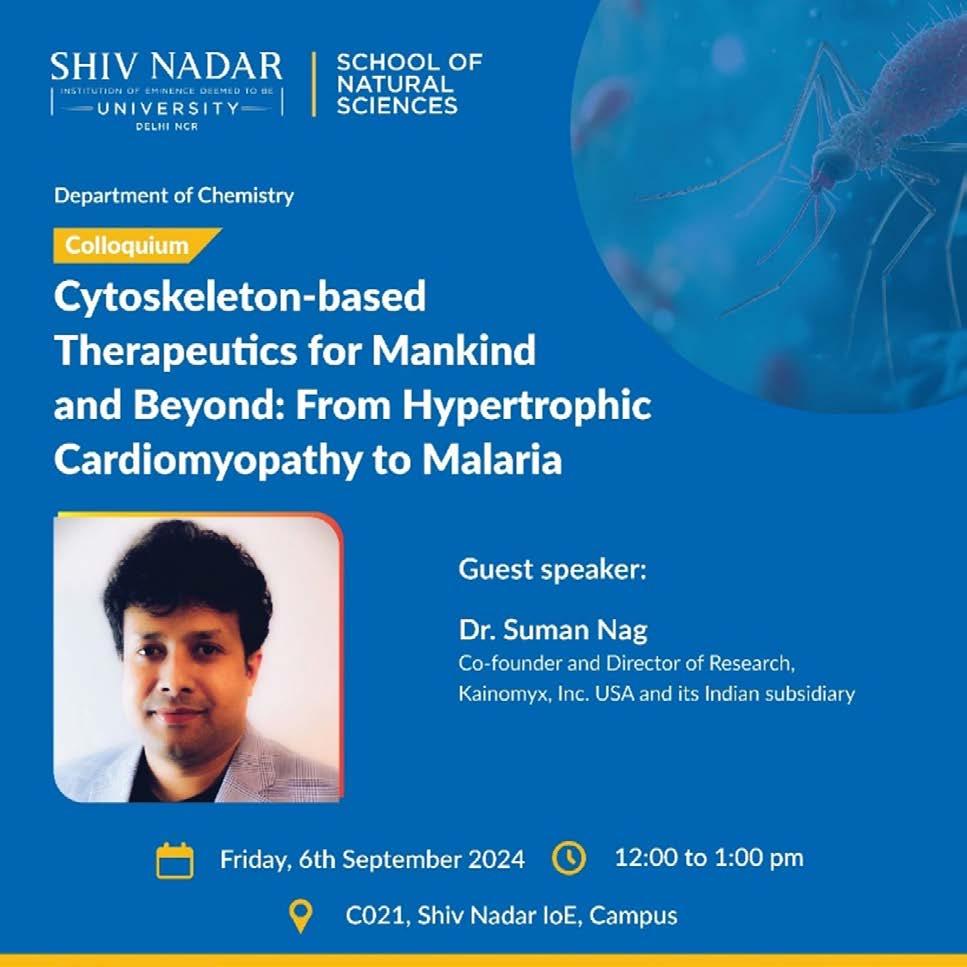
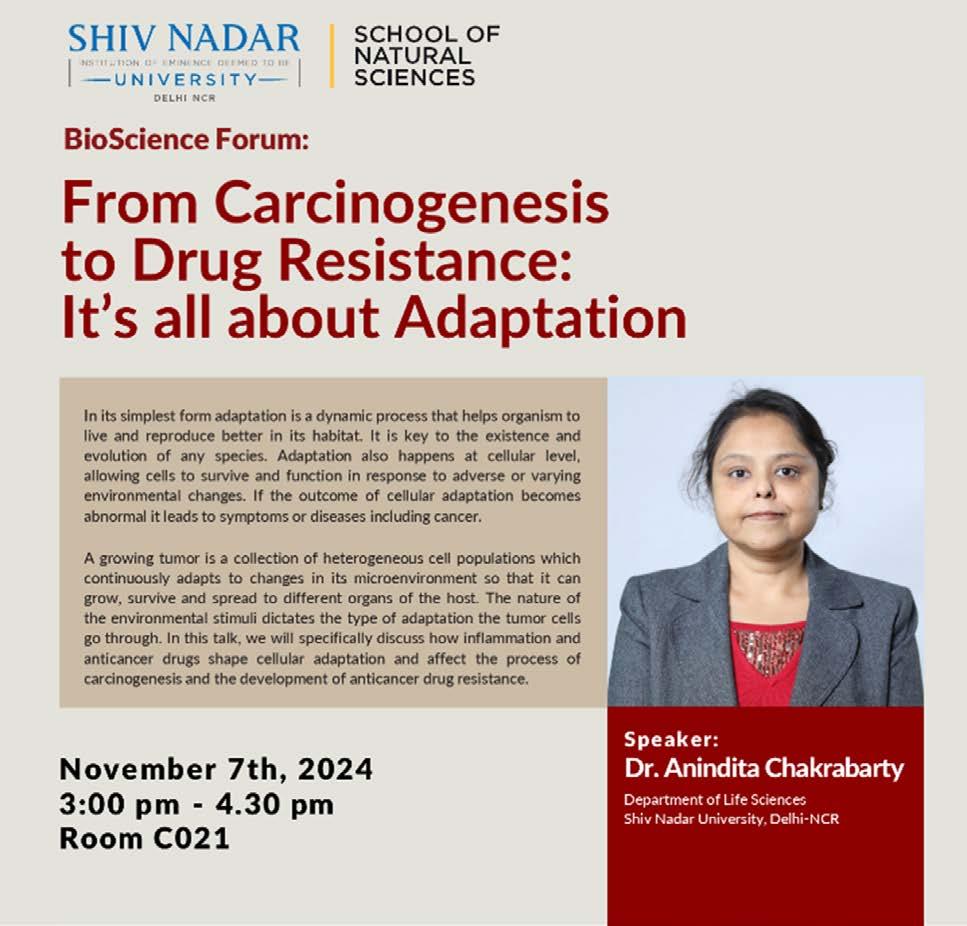
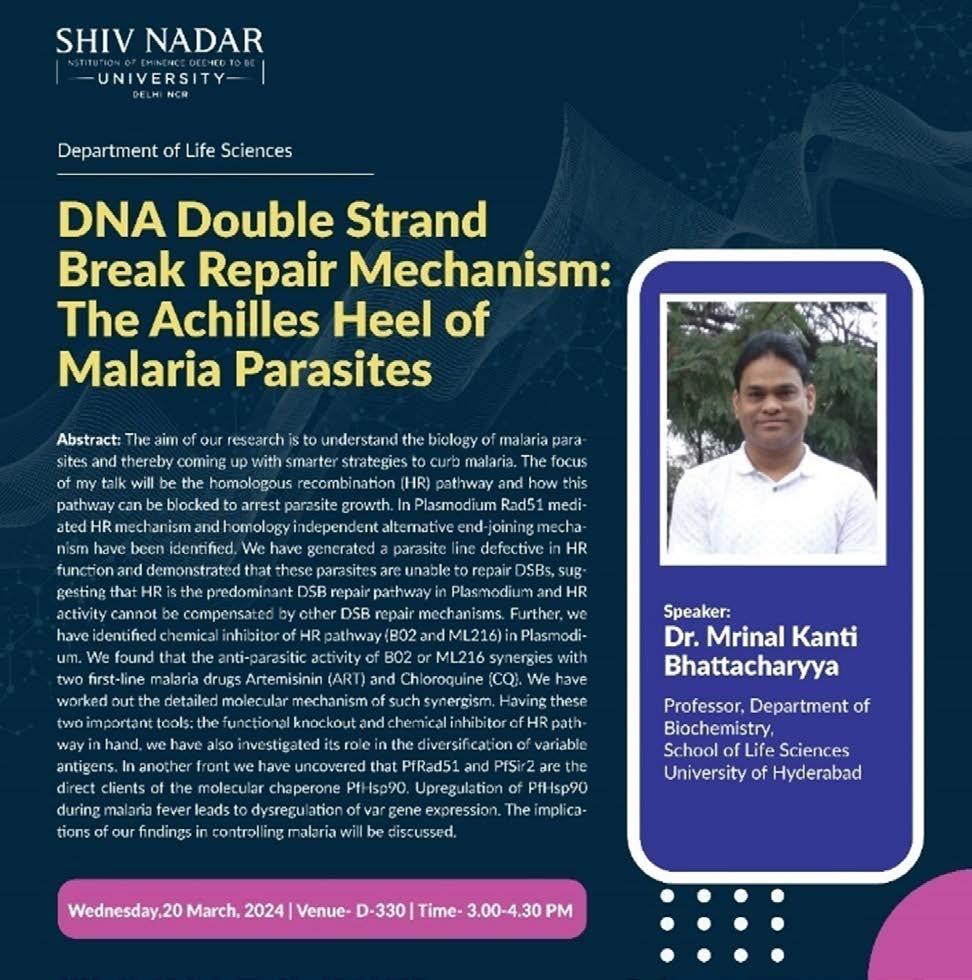
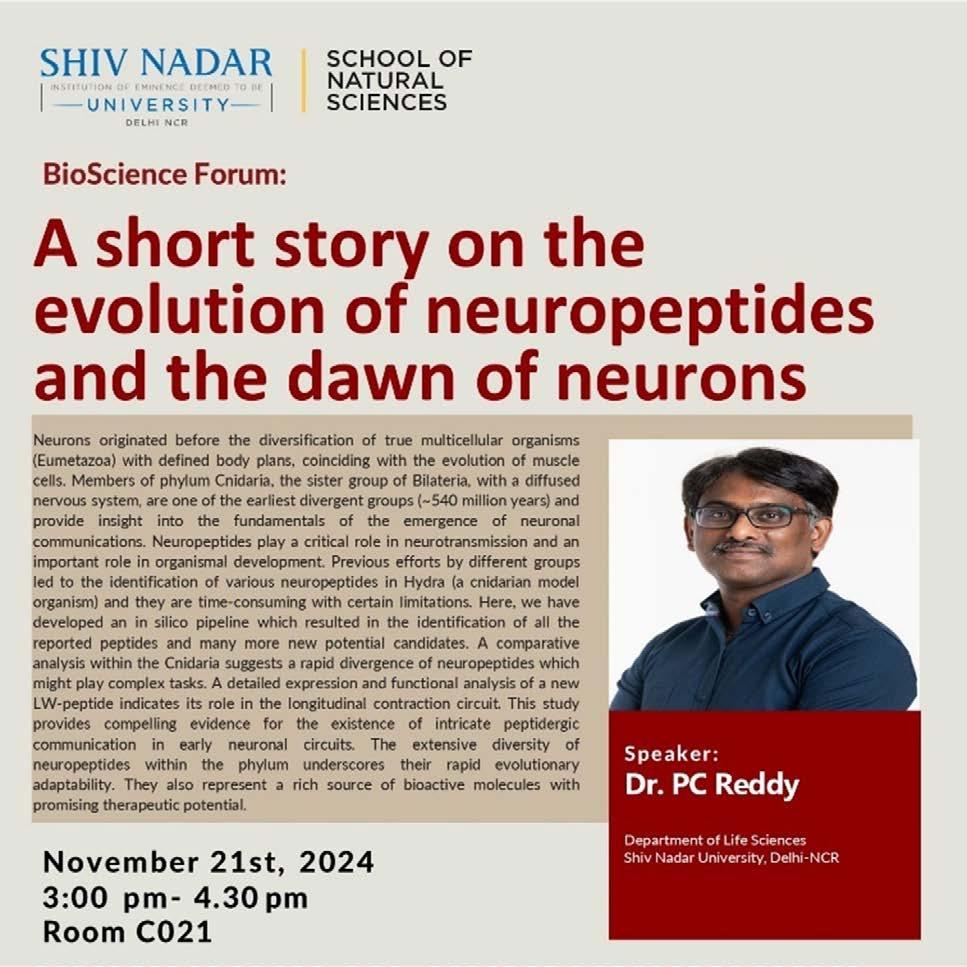

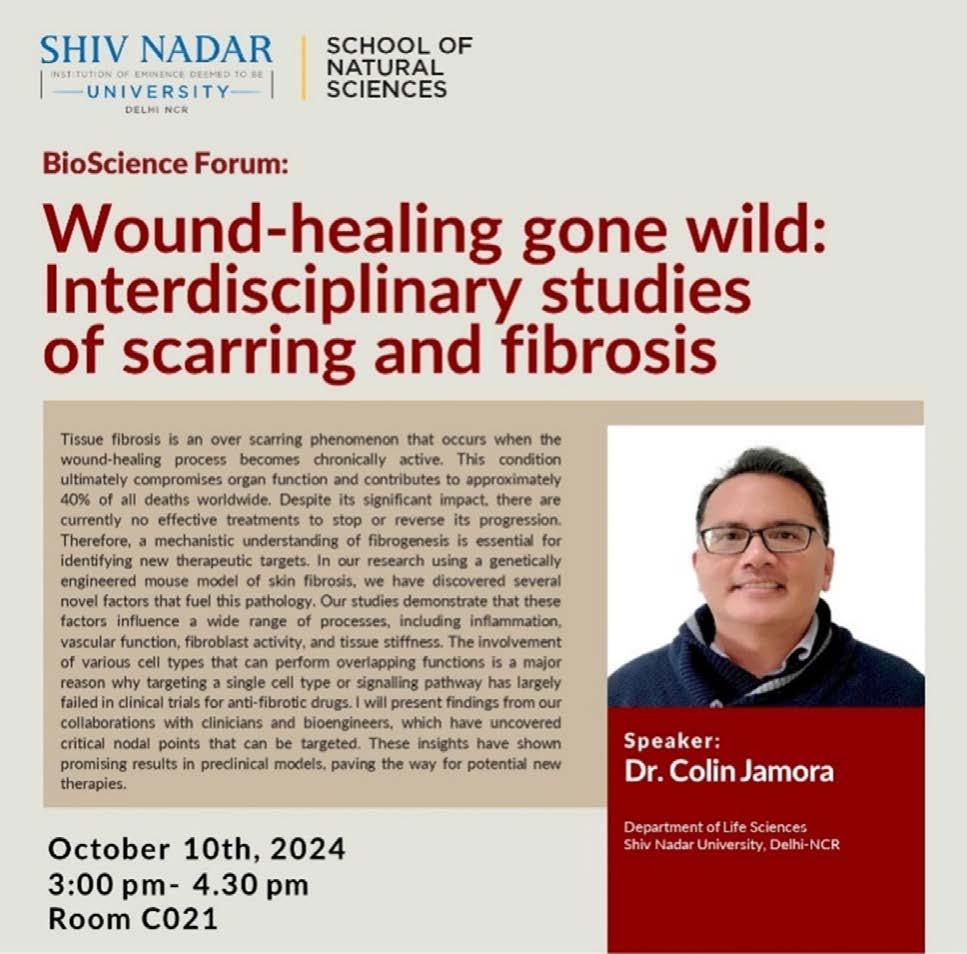
INSTITUTIONAL PRACTICES
At Shiv Nadar, health and well-being are essential to academic, professional, and personal success. We have put in place many important health and support services. Deliver regular workshops to train students and staff. And provide the necessary education and training for our contractual support staff.
Health and Wellness
The University has a health center with residential paramedic staff and visiting doctors. It provides physical and mental health support through a primary health care setup and an OPD. The center has general and emergency wards with necessary equipment, managed by professionally qualified and well-trained paramedic staff, 24/7 nursing staff & an ambulance. All members of the University can avail themselves of services and book appointments through a well-defined process. In addition, we have a committed team of doctors (general physicians), counselors, dentists, physiotherapists, and visiting psychiatrists to provide a safe, welcoming, and affirming environment for all students while supporting and enhancing all students’ psychosocial well-being and development.
Medical insurance
All students and staff can avail of a medical insurance policy covering medical issues requiring hospitalization beyond the on-campus services.
Indoor Sports Complex (ISC)
We have a uniquely designed, state-of-the-art Indoor Sports Complex (ISC). ISC has a fully equipped unisex fitness center (Gym) with high-end cardio machines, weight stations, strengthening equipment, and a 200-meter-long indoor running track. Regular yoga and meditation sessions are organized at the meditation and yoga hall. The University offers other indoor and outdoor sports facilities: horse riding, golf, cricket, basketball, badminton, tennis, football,

billiards, etc. The Department of Physical Education regularly hosts events.

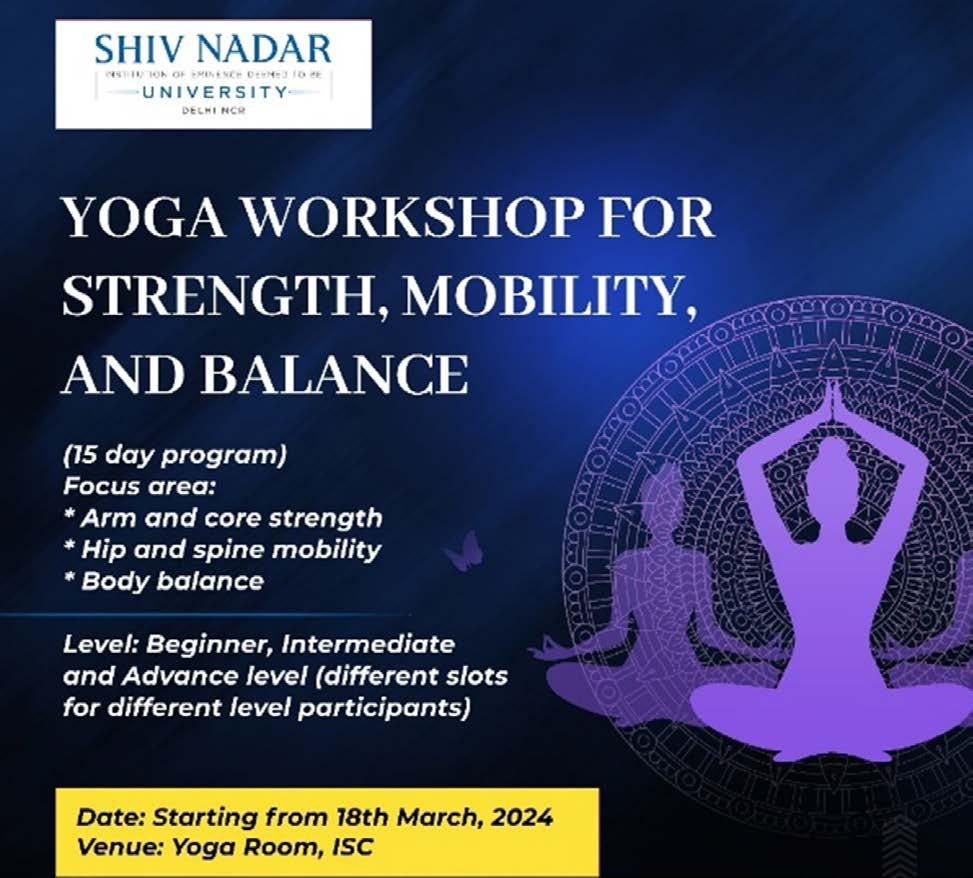
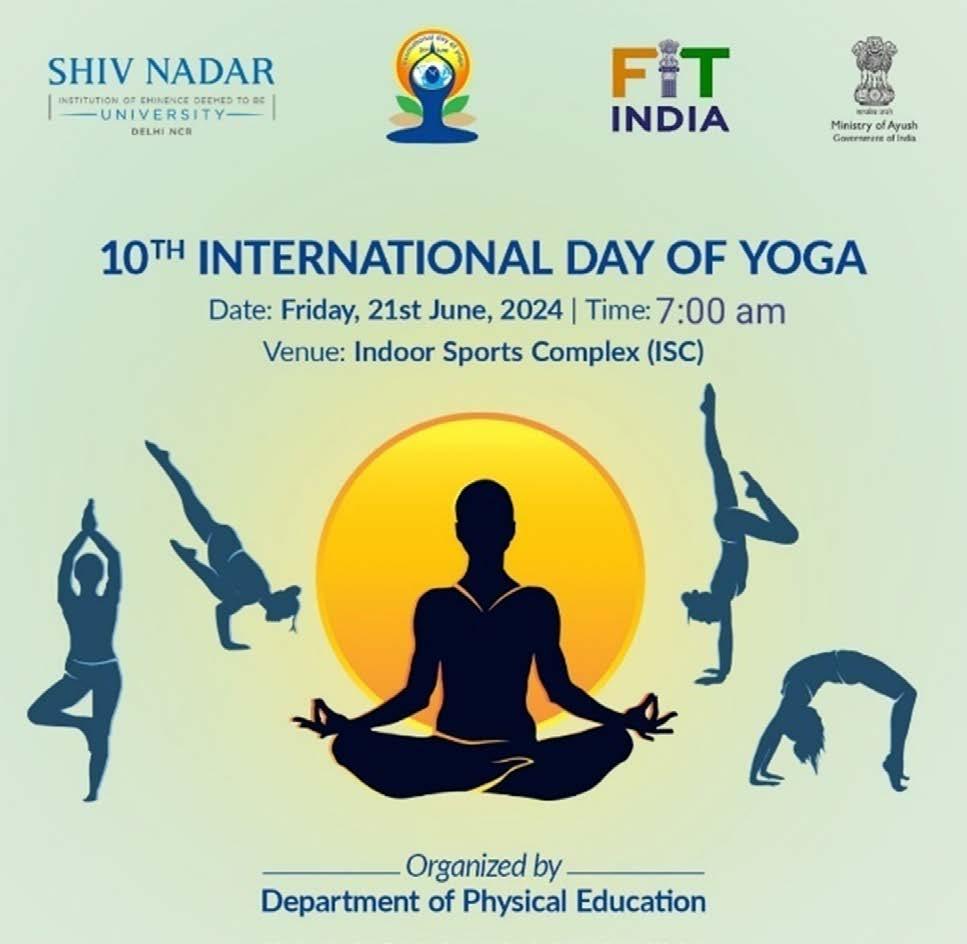

Zero tolerance policy
At Shiv Nadar, we observe zero tolerance for Procuring, possessing, consuming, aiding, and selling of any narcotic drug or psychotropic substances and have a set of rules and policies.
Health
advisories and blood donation camp
The University organizes advisories on wellness and preventive measures, peer support groups, online awareness programs, and global mental wellness series. Regular blood donation camps are organized that allow many students, staff & faculty to donate blood.
Metanoia, a student club
Metanoia is a mental health awareness and wellness club that aims to create a safe space to discuss mental and physical health issues. The club invites experts and organizes many engaging seminars, workshops, and activities on mental health and emotional well-being, managing stress and building resilience, strategies for enhancing emotional Intelligence, and suicide prevention. The medical personnel on campus supervise the club activities.
Student support system
The Office of the Dean of Students (ODS) selects Family Groups to support first-year undergraduate students. A family head is chosen from the senior classes to aid in a seamless and friendly transition during the initial settling phases of first-year students. These groups help students get support and guidance and facilitate their access to necessary information.
Emotional wellness sessions in collaboration with YourDOST
Understanding the importance of Emotional Wellness and mental health among students and staff, we organize interactive sessions on Emotional Wellness in collaboration with YourDOST, an Online Emotional Wellness platform. There are 800+ counselors on the platform offering to counsel in
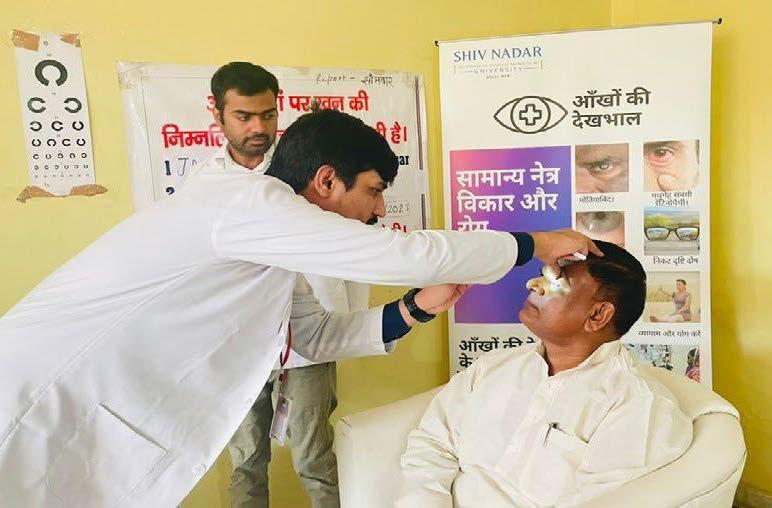
regional languages. This is a free-of-cost service for Shiv Nadar University students, who can use the portal online and make an appointment with counselors for an online chat-based/ audio or video session.
Training housekeeping staff and providing them access to regular health checkups.
Regular workshops are conducted to train and educate our support staff on health and clean sanitation.
On November 12, 2024, the Active Dreams and Gender Champions SNIOE Chapters organized a Menstrual Health Session for housekeeping staff. A gynaecologist led the session to raise awareness, dispel myths, and provide vital information on menstrual health. Key topics included understanding the menstrual cycle, debunking taboos, hygiene practices, and addressing health concerns like cramps and irregularities. Participants actively engaged in a supportive environment, followed by a free health checkup. All restrooms on campus have sanitary pads and safe disposal machines.
PARTNERSHIPS
The Biopolitics of Global Health After Covid
The New Frontiers Grants Program at Cornell University has awarded the project “The Biopolitics of Global Health After Covid” for 2023-25. Yasmeen Arif, Professor of Sociology/Social Anthropology, SHSS, is the partnership lead at the Shiv Nadar University with Prof. Timothy Campbell (PI), Italian Studies, Cornell University, USA, and Prof. Davide
Tarizzo, Philosophy, at the University of Salerno, Italy.
The project brings together sociologists, philosophers, and anthropologists from around the world to discern the effect of the COVID-19 pandemic on how global health is understood and practiced today. The collaborators will investigate how the pandemic changed perceptions of illness, health, science, and ethics and reconfigured relationalities between doctors and patients, institutions and subjects, neighborhoods and communities, and politics and governance. By situating part of the investigation in the Global South, the project challenges the Global North perspective that continues to dominate accounts of the pandemic and highlights the importance of local knowledge; advances research on biophilosophies and anthropology by creating a dialogue among the qualitative human sciences; elaborates frameworks able to renew perspectives on global health that rely less on exclusion and more on inclusion; and articulates a quest for a future in which institutions are better able to meet the challenges presented by the next pandemic.
Partnership with the Tata Institute for Genetics and Society
Shiv Nadar University, Delhi-NCR, has signed a Memorandum of Understanding (MoU) with the Tata Institute for Genetics and Society, India, paving the way for transformative advancements in healthcare, agriculture, and education. Founded in 2017 by the Tata Trusts, TIGS is a not-for-profit research institute
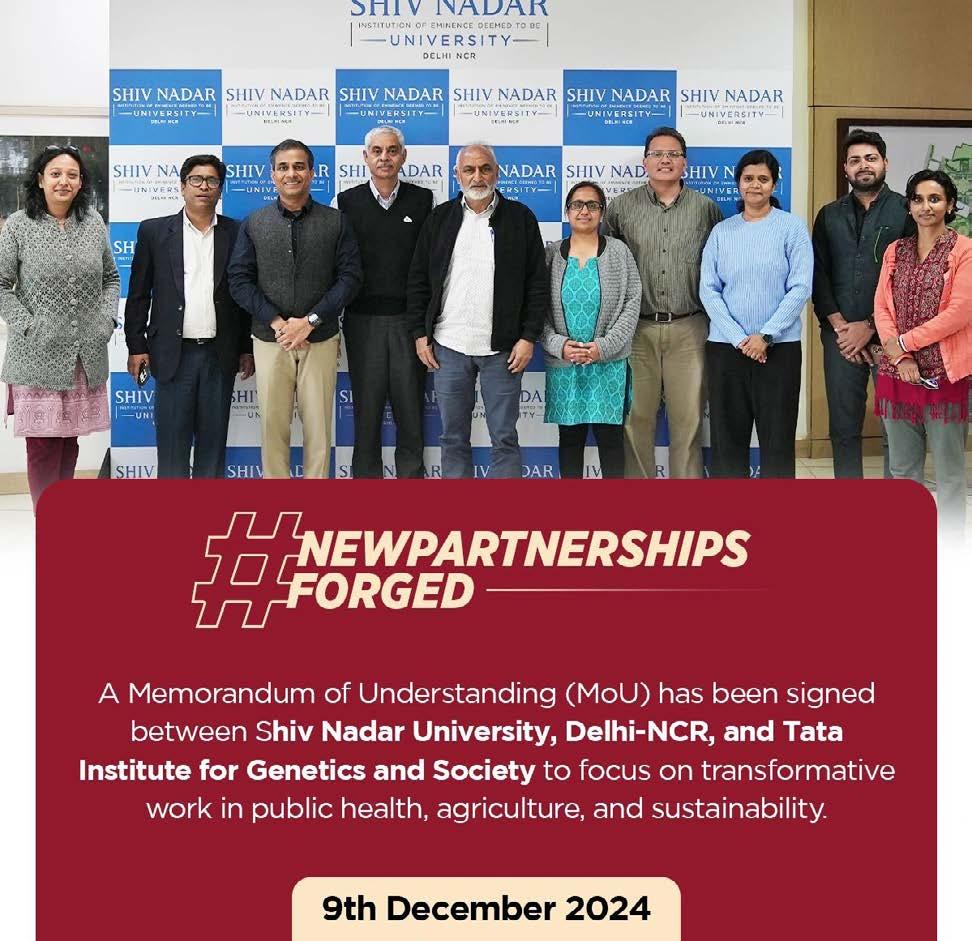
committed to leveraging the power of genetics and genomics for societal progress. The institute focuses on three critical areas: Infectious Diseases, Rare Genetic Disorders, and Crop Improvement.
This collaboration aims to foster a robust exchange of expertise and resources, granting researchers access to cutting-edge facilities at both institutions. By integrating fundamental and applied research, the partnership seeks to cultivate a synergy that accelerates groundbreaking discoveries and their real-world implementation.
India-EMBO lecture course
An India EMBO Lecture Course on Posttranscriptional regulation in Ageing and AgeRelated diseases was organized from June 10-15, 2024, at Shiv Nadar University in partnership with Indraprastha Institute of Information TechnologyDelhi (IIIT-D).
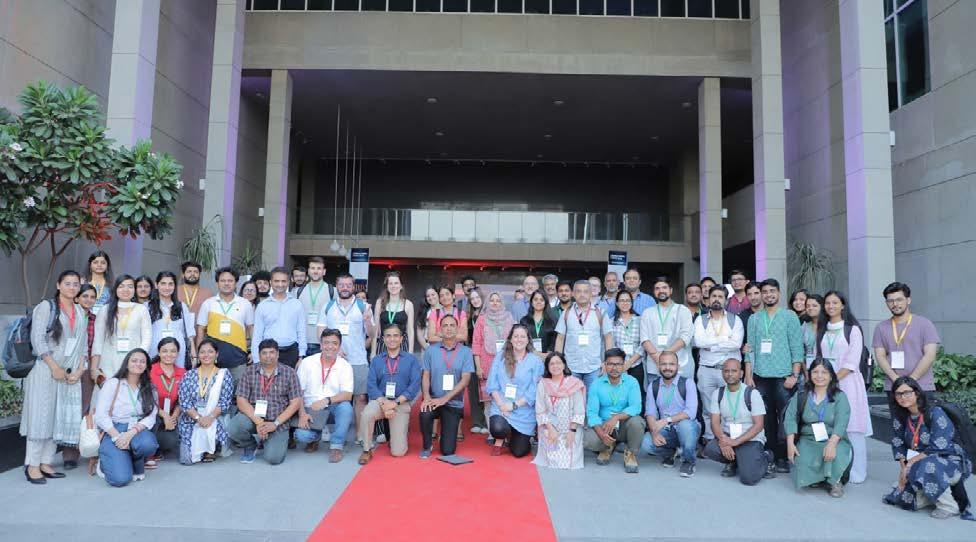
This India EMBO Lecture Course brought together national and international experts who shared novel research trends— beyond transcription—in regulating healthy ageing and age-associated diseases. The research presentations spanned molecular explorations and genetic screening to whole-organismal phenotypic assessment. The topics covered provided a balanced view of post-transcriptional mechanisms that regulate ageing and age-related diseases, such as cancer, cardiovascular, and neurodegenerative diseases. They included RNA-binding proteins, non-coding RNAs, Proteostasis, AI, Omics, and Systems biology approaches.
Partnership with Kapahi lab at the Buck Institute for Research on Aging in California
Dr. Geetanjali Chawla, Associate Professor, Department of Life Sciences, is undertaking

interesting research on post-transcriptional regulators of aging and dietary restrictions.
The project, in collaboration with the Kapahi lab at the Buck Institute for Research on Aging in California, aims to uncover the role of evolutionarily conserved miRNAs in mediating DR-dependent lifespan extension (Pandey et al., 2021; Wilson et al., 2021). In a more recent collaborative study, the researchers have uncovered the role of a gene, mustard (mtd), in Drosophila. Genetic variants in the human homolog of mtd, OXR1, are associated with DR-dependent longevity. Identifying the dietary and genetic factors that regulate mtd/OXR1 and demonstrate its necessity for the maintenance of the retromer, a heteropentameric complex of proteins necessary for recycling transmembrane proteins and lipids from endosomes to the transGolgi network or the cell membrane. This further reiterates that mtd/OXR1 regulates a network of genes essential for protecting against brain aging and neurodegenerative diseases across flies and humans (Wilson et al., 2024).
This research program is directly relevant to studying human age-associated diseases, as the inappropriate expression of miRNAs has been linked to several pathogenic states and molecules that alter the function or abundance of miRNAs, emerging as potential therapeutic agents to treat diseases.
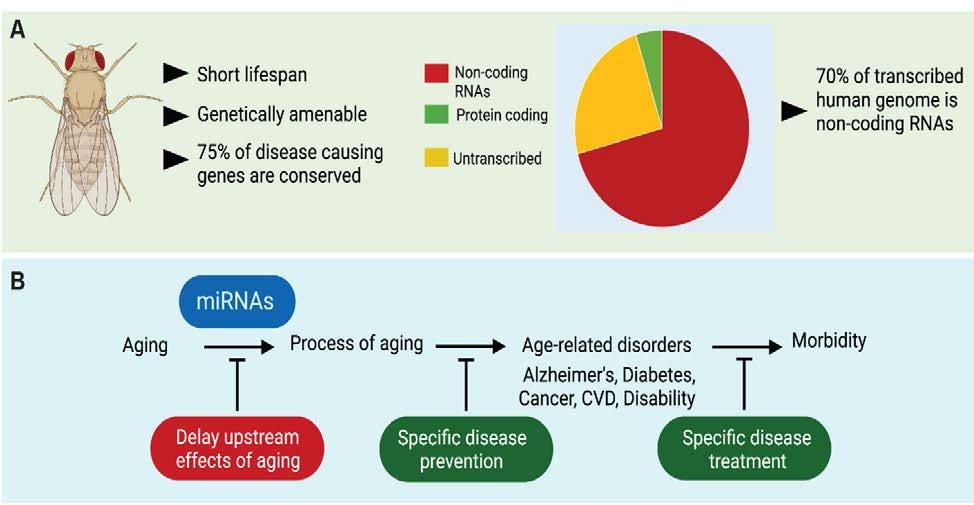
Poverty, migration, and ITN are used to control malaria in SSA.
Dr. Samit Bhattacharyya, Associate Professor, School of Natural Sciences, in partnership with the University of Heidelberg (Germany), is pursuing a Game-theoretic approach to modeling and estimating the impact of human migration behavior on malaria endemicity in Sub-Saharan Africa. (20222025)
Insecticide-Treated Net (ITN) is the most effective control used for malaria in sub-Saharan Africa. However, it is seen that poor people use the ITN for fishing and fencing to increase daily productivity instead of proper use. Although ITNs have been widely distributed to malaria-endemic regions in the past, their success has been threatened by misuses (in fishing, agriculture, etc.) and decay in ITN efficacy. Decision-making in using the ITNs depends on multiple coevolving factors: malaria prevalence, mosquito density, ITN availability and efficacy, and other socio-economic determinants. While ITN misuse increases as the efficacy of ITNs declines, high efficacy impedes proper use due to free riding. This irrational usage leads to increased malaria prevalence, thereby worsening malaria control efforts. It also remains to be seen if the optimum ITN use for malaria elimination can be achieved under such an adaptive social learning process. Here, we incorporate evolutionary game theory into a disease transmission model to demonstrate these behavioral interactions and their impact on malaria prevalence. We show that social optimum usage is a function of transmission potential, ITN efficacy, and mosquito demography. Under specific parameter regimes, our model exhibits patterns of ITN usage similar to observed data from parts of Africa. Our study suggests that providing financial incentives as prompt feedback to improper ITN use can reduce misuse and contribute positively towards malaria elimination efforts in Africa and elsewhere.
Partnership to perform clinical studies to assess the role of dietary interventions and RNA signatures
Dr. Geetanjali Chawla, Associate Professor, Department of Life Sciences is initiating has collaborated with the Central University of Kerala (CUK), Kerala, and the Saint John Research Institute (SJRI), Bengaluru, to perform clinical studies to assess the role of dietary interventions and RNA signatures in the context of two significant health and nutrition challenges faced by the Indian population i.e. Type 2 Diabetes mellitus and the Double Burden of Malnutrition (DBM). The DBM grant has been approved by DBT for 2023-26, and Type 2 Diabetes mellitus will be supported by CSIRASPIRE for two years.
Partnership to understand the mode of action of various experimental and approved anti-cancer drugs and natural products.
Dr. Anindita Chakrabarty, Associate Professor at the Department of Life Sciences, works on the mode of action of various experimental and approved anti-cancer drugs and natural products - to devise effective and less toxic therapeutic strategies for cancer patients.
A unique feature of this research is to tackle the problem of anticancer drug resistance in real-time, which will help prevent it early and save patients from unwanted toxicity and disease recurrence. By collaborating with electrical engineers, they are developing a technique for controlling unresectable cancers through high-voltage nanosecond electric pulses, also marketed as nanoknife in the USA. Dr. Chakraborty’s team is also working to explore the possibilities of repurposing a few synthetic and naturally occurring anti-cancer agents as SARSCoV-2 antivirals that may be significant in the use of nontoxic alternatives to the currently available antiviral paxlovid, marketed by Pfizer.
This is an ongoing research collaboration with Dr. F. Peter Guengerich, a world-renowned biochemist at the Vanderbilt University Medical Center, who helps in drug development, metabolism, and toxicity studies. Dr. Goutam Chowdhury, Assistant Professor and an expert in chemistry, biochemistry, and molecular toxicology, guides us in drug metabolism, toxicity, biochemistry, and analytical chemistry (LCMS, LC-MS/MS, and NMR).
Next-generation membrane-active glycopeptide antibiotics that also inhibit bacterial cell division
Dr. Richa Priyadarshini, Associate Professor, Department of Life Sciences, in collaboration with Prof. Jayanta Haldar at the New Chemistry Unit and School of Advanced Materials, Jawaharlal Nehru Centre for Advanced Scientific Research (JNCASR), Bangalore, India, is researching the resistance to vancomycin, a life-saving drug against Gram-positive bacterial infections, necessitates the developing alternative therapeutics.

The team reports on vancomycin derivatives that assimilate mechanisms beyond D-Ala–D-Ala binding. The role of hydrophobicity towards the structure and function of the membrane-active vancomycin showed that alkyl-cationic substitutions favored broad-spectrum activity. The lead molecule, VanQAmC10, delocalized the cell division protein MinD in Bacillus subtilis, implying an impact on bacterial cell division. Further examination of wildtype, GFP-FtsZ, or GFP-FtsI producing- and ΔamiAC mutants of Escherichia coli revealed filamentous phenotypes and delocalization of the FtsI protein. The findings indicate that VanQAmC10 also inhibits bacterial cell division, a property previously unknown for glycopeptide antibiotics. The conjunction of multiple mechanisms contributes to its superior efficacy against metabolically active and inactive bacteria, wherein vancomycin is ineffective. Additionally, VanQAmC10 exhibits high efficacy against methicillin-resistant Staphylococcus aureus (MRSA) and Acinetobacter baumannii in mouse models of infection.
Community Initiative through the Community Connect Program
Through its Community Connect Program, Shiv Nadar University strongly focuses on community engagement in Dadri. These initiatives aim to uplift the local community through various programs, including skill development, healthcare awareness, and promoting sustainable practices.

One such initiative is Arogya Dadri, a partnership with IPE Global Limited, Centre for Knowledge & Development (CKD). This initiative includes regular training sessions on topics like Non-Communicable Diseases (NCDs) for healthcare workers at the Community Health Centre, Dadri. The sessions aim to enhance knowledge and equip ASHAs, ANMs, and community health officers with the skills to address NCDs effectively and understand NCG management, thus reinforcing their roles in combating these health challenges.


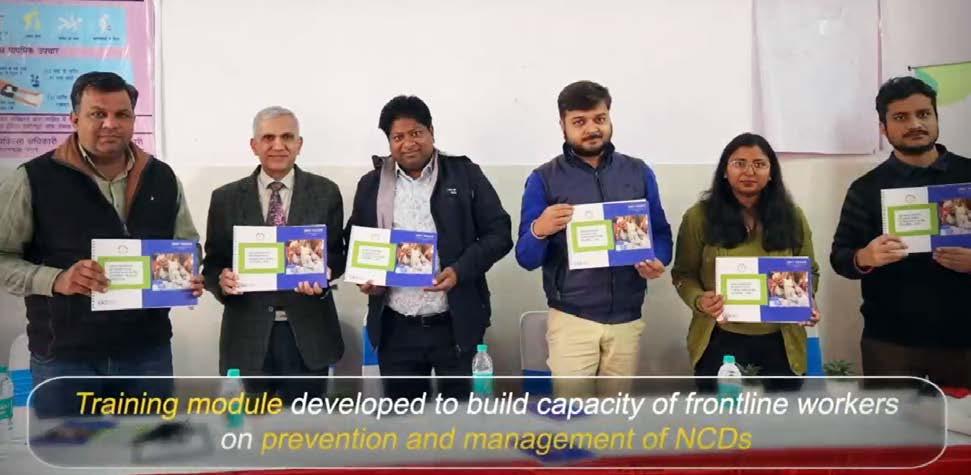
Public access to university sports facilities - Khelo Dadri
At Shiv Nadar, we provide sports facilities to train students from schools and host tournaments and championships. Training for specific sports is offered to students from VidyaGyan School, Bulandshahar.
Besides, Khelo Dadri is a university initiative to engage with the youth of its neighboring communities. The initiative promotes sporting events to help school children excel nationally and internationally. These students participate in many state and zonal championships.
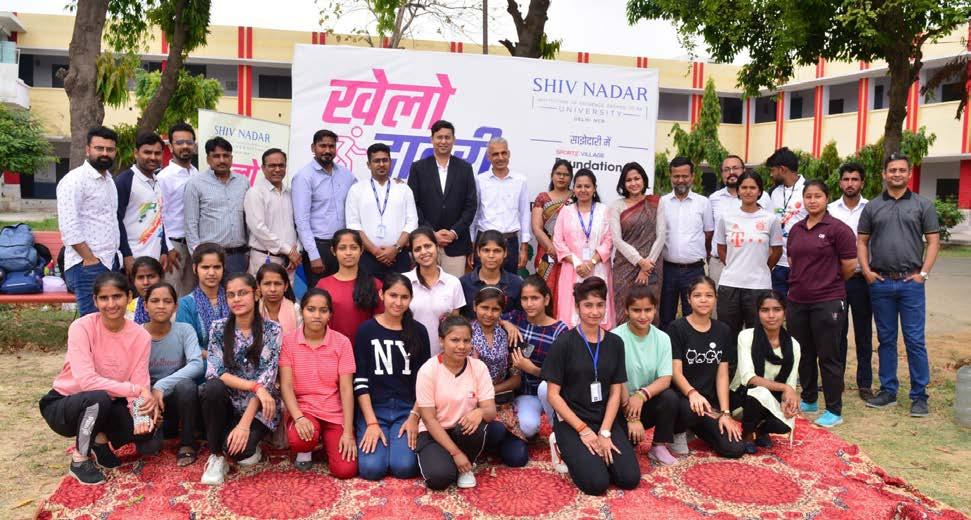
Shiv Nadar Institution of Eminence is fully committed to the UN Sustainable Development Goals (SDGs). We have embraced a four-pronged strategy for SDGs through teaching, research, our core institutional practices, and partnerships.
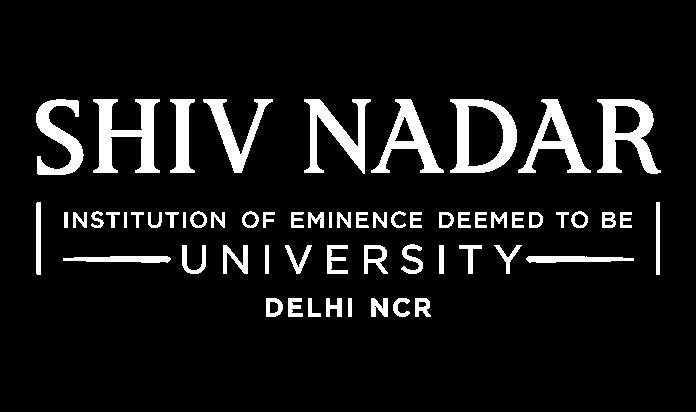
Deepa Hazrati Senior Manager, Office of the Vice-Chancellor deepa.hazrati@snu.edu.in
India
